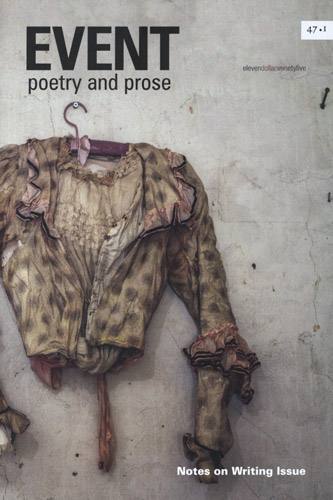EVENT – Spring/Summer 2018
EVENT, a Canadian magazine published out of Douglas College, celebrates its thirtieth year printing a Notes on Writing issue. Established Canadian authors open the issue with essays reflecting on their lives as writers and writing as a piece of their lives. But more than simply reaching out to writers, EVENT grapples with questions writing can help answer, questions about discomfort and, at times, violence. Benjamin Hertwig’s Notes on Writing essay leaves us with the phrase, “uncomfortable in a most necessary way.” I couldn’t help but read the issue through that lens.
EVENT, a Canadian magazine published out of Douglas College, celebrates its thirtieth year printing a Notes on Writing issue. Established Canadian authors open the issue with essays reflecting on their lives as writers and writing as a piece of their lives. But more than simply reaching out to writers, EVENT grapples with questions writing can help answer, questions about discomfort and, at times, violence. Benjamin Hertwig’s Notes on Writing essay leaves us with the phrase, “uncomfortable in a most necessary way.” I couldn’t help but read the issue through that lens.
Hertwig’s essay “On Violence and Memory” is, on one level, exactly what the title implies: an essay teasing apart violence and memory through the lens of the Notes on Writing theme. Hertwig considers his misremembrance of his years as a soldier in Afghanistan and how “I write about my own experiences of violence because writing helps me stay alive when I don’t want to be.” And yet the heart of the essay goes beyond his experience as a veteran and a writer. Hertwig is interested in his own culpability in violence, his privilege, and the greater implications of decades of violence built into Canadian culture.
In Nina Mosall’s “Oshe and Yogurt,” the narrator is on a plane and prays in transliterated Arabic as she thinks about her mother. Mosall identifies the race of the characters through metaphors in parentheses, so that a man on the plane who watches the narrator pray is understood as white, because “([his] eyes are two lakes, / [his] skin has a touch of snow)”. Through the use of parentheses, race, ethnicity, and religion become hypervisible pieces of this poem, though they are cornered off as if invisible. Mosall’s second poem, “Who Hears Hasan” provides hope in the face of a world which seems to turn a blind eye and a deaf ear to those who pray. Though Hasan has decided to no longer pray, “He wants to yell [ . . . ] Answer me, / answer me, / answer me.” And in response:
the distant call
of his mother: Hasan, are you there?
I thought I heard you
come in.
The call and response nature of the poem creates hope in the context of questioning God and questioning prayer.
Though the poetry outshines the prose in this issue of EVENT, Jessica Lampard’s “The Secret” lures a reader into the first plural point of view: into the head(s) of triplet young girls who enjoy keeping secrets. Lampard’s narration reflects their mindset that they are one and the same girl, “Even our parents tell us we’re more or less one person.” But when the triplets decide they’re going to get their first kiss from three boys in their class, the individuality of a singular narrator emerges. The singular first-person narration peeks in and out as the narrator struggles with questions of individuality. When the triplets and the boys play spin the bottle, the narrator says, “I drift my tongue to his bottom lip and suck,” before shifting back to the collective we. Lampard slowly reveals the individuality of her characters and stresses the inability to ever know someone as intimately as the narrator suggests she knows her siblings.
EVENT concludes the issue with book reviews of both fiction and nonfiction. The format for these reviews is a bit jarring, as two books are reviewed at once. Jay Ruzesky reviews Ven Begamudré’s Extended Families: A Memoir of India and Yvonne Blomer’s Sugar Ride: Cycling from Hanoi to Kuala Lumpur. Ruzesky compares these pieces of nonfiction in one review because both authors choose non-linear structures. But I would have had an easier time following the reviews if each review had a separate space in the magazine, rather than a small page break. The decision to review both under the same title and heading suggested a stronger connection between the two books than the reviewer provided.
But Kathy Mezei’s reviews of Boundary by Andree A. Michard, translated by Donald Winkler, and Anima by Wajdi Mouawad, translated by Linda Gaboriau, does what I had been hoping Event would do all along: call violence into question. Although violence was not a centerpiece of EVENT, the idea lingered in my mind and resurfaced specifically in Mezei’s review of Mouawad’s Anima. Mezei expresses her hesitation and reluctance to read the violence of Mouawad’s work, especially because he’s a male author. She ends the review (and concludes EVENT) with the thought, “And I wonder too if one could find alternatives to [ . . . ] violence other than more violence.”
This issue draws on discomfort, on characters engaged in questions without easy answers. As a Notes on Writing issue, EVENT does not suggest writing will provide an answer to violence and blame, or to questions of identity. But as Shashi Bhat says in the Editor’s Note, these authors do a complex dance to “demonstrate conviction and humility.” EVENT proves that writing is about finding the words to ask the question, and that posing an answer, merely suggests one more answer among many.
[www.eventmagazine.ca]





